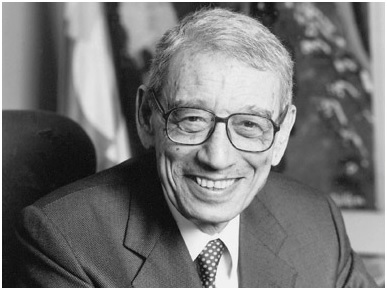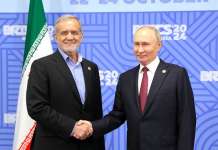In his sober office on the eleventh floor of a colossal building overlooking the Nile, he warmly received me with a gentle and tender smile and invited me to take place on an old sofa in front of his desk. He rejoined me with his height bent under the heavy charges of years of diplomatic and humanitarian struggles and fights. His skinny wrinkled face with the hollowed cheeks and the narrow exhausted eyes, hidden behind thick medical glasses, surrounded by his silvery curled hair, seemed belonging to a mummy of a Pharaoh that just came to life to witness for the greatness of a bygone era.
He stayed in an armchair close to me and, without wasting the time, he plunged into a rich and profound conversation on the project that lead me to meet him. Incredulous, I did not want to miss neither one of his words, nor a detail of the whole scene that looked to me unreal.
Months before having the idea of meeting him, his book, Democratising the Globalization, fell, by pure chance, into my hands. Its title keenly attracted me. How could be the relation between these two ideologically extremely opposed poles! If democracy has a subtle and sophisticated connotation, the globalization is considered as a devastating flood that erases the features of the countries and the nations in favor of one dominant aspect that imposes its supremacy to the detriment of the will of the international population.
Impatient to unravel the mystery of the book, I read it in few hours to decide right after to translate it, from French into Arabic, under the guidance of the author himself, the former Secretary General of the UN, the controversial Boutros Boutros Ghali, who was among the few leaders of the international organization, since its establishment after the Second World War, in 1945, who were not elected for a second mandate. In his case, he was not re-elected for having taken a firm position against the US policies regarding some thorny international conflicts.
After long correspondences with his office in Paris, Dr. Ghali replayed to me in person, in autumn 2008, and accepted to receive me in his Cairo office in the Egyptian National Council for Human Rights, when he would be there in few weeks, to answer my questions raised by his revolutionary ideas exposed in his book that takes the form of series of innovative and fascinating dialogues between him and the famous French economist, Yves Berthelot, who smartly and skilfully conducted the debate on current crucial and intriguing topics
For nearly a month, I had the chance to drew, almost daily, precious information and rare wisdom from a remarkable humanist and a savant person that humbly deigned to generously share his vast knowledge and his unique experience in diplomacy and human rights to confer depth and richness to the translation of his work that, for making it more precise and accurate, he took the precaution of revising, himself, its Arabic version that I had the honour and the pleasure to achieve under his aegis.
Amal M. Ragheb
(Carmen Aprahamyan)
International Journalist, Writer and Certified Translator












